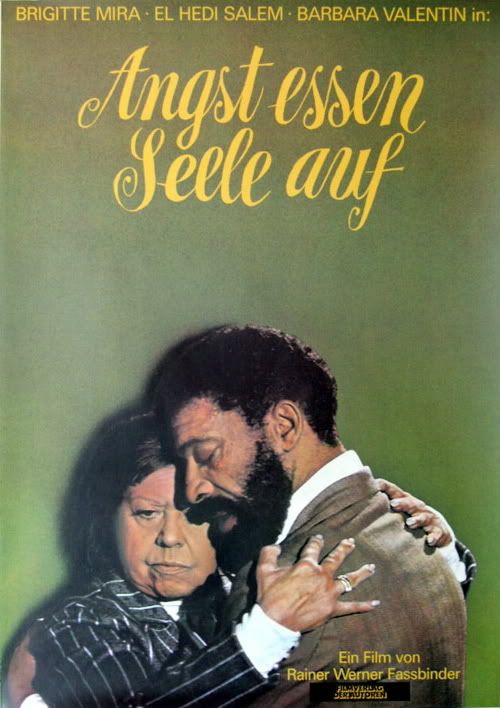
So this week we watched the Fassbinder masterpiece: Ali: Fear Eats the Soul. The misleading title sounds kind of like a horror film but it's not. I failed completely to catch the connection between Fear Eats the Soul and Harold & Maude. They'd make a good double feature: Age transgression films of the 1970's.
The reason I assign this film is because it's so simple in terms of plot yet complex in terms of emotions. This is the kind of film where the story is the big special effect. It explores the taboo relationship between an older German Putzfrau (cleaning lady) and a Moroccan Gastarbeiter (guest worker). The details of their relationship are covered in honest and emotional detail. There's nothing exploitational going on here and the sincerity of their feelings for each other hooks the viewer in and keeps you hanging on to see how things will turn out.
I've heard a theory recently that we go to movies to worry. We sit there in the audience asking, "will they be able to stay together despite everything that's happening to them?" Each plot point in the movie deepens that worry. They defend themselves against external racism in the first half and then come to terms with their internalized cultural clashes in the second half.
In the beginning of the story Fassbinder uses examples of rascism both overt and understated to make his point. Some people in their orbit give them the evil eye so to speak. My favorite is the waiter at "Hitler's favorite restaurant" who stares through them with a gaze that could mean anything but almost certainly means disgust. Of course the most shocking moment comes when Emmi's family meet her new husband, Ali for the first time and they FREAK OUT. Her son even goes so far as to kick in her television. It's awesome. The lesson here is that you've got to let your characters freak out from time to time. It's a huge moment and an emotional release for the audience.
The second half, as I mentioned, deals with the internal enemy to their relationship. When it was Ali and Emmi against the world they were united. Once the people near them begin to accept that Ali's not going anywhere Emmi and Ali grow apart. Why? They have the acceptance they originally sought. Well they're not done growing. See your characters need to have 2 fights in every movie. The first fight is against the outside world. Whatever villain they're chasing or antagonist they're dealing with represents the external fight. The second fight is a bit harder to describe. It's psychological. The way I like to pin it down when I'm outlining a new story is I ask myself, "Why does this character have to go on this journey?" There's some part of the journey that will heal the damage done by life, society, or themselves. For Emmi she needs to let Ali be the man he is instead of trying to turn him into a respectable German. If you think about the movies you love and ask yourself, "why did the main character need to go on this journey" you'll come up with the answer. A good exercise is to outline those films and highlight the specific scenes that deal with that internal fight.
Fassbinder's one of my favorite filmmakers because I love watching Germans be mean to other Germans. Schadenfreude, Weltschmertz und natürlich Verfremdungseffekt.



No comments:
Post a Comment